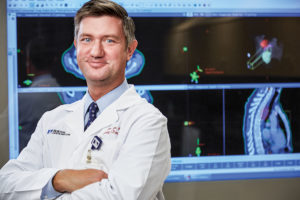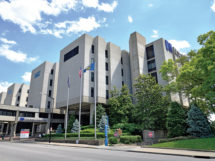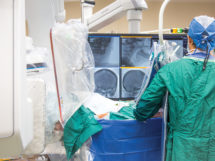
In a year brimming with bad news, there is some good news to report regarding lung cancer trends.
According to data released in June by the U.S. Department of Health and Human Services, death rates from lung cancer in Kentucky have steadily decreased since 1999, from 73.9 to 56.7 deaths per 100,000 people.
While Kentucky remains the state most affected by lung cancer, Norton Cancer Institute has been at the forefront of the battle against the scourge.
“It used to be that lung cancer was treated primarily with toxic chemotherapy,” said Joseph M. Flynn, D.O., MPH, FACP, chief administrative officer of Norton Medical Group and physician-in-chief of Norton Cancer Institute. “Now, we are seeing great success with targeted therapies, such as immunotherapy, and are working to advance our understanding of this disease through a number of other treatment options through our drug trials.”
It is the availability of such treatments and the institutional commitment to continued discovery and treatment that brought medical oncologist/hematologist Adam D. Lye, M.D., to the Norton Cancer Institute in 2018.
“Utilizing immunotherapy-based regimens has been incredibly effective in treatment of lung cancer,” Dr. Lye explained. “These treatments can provide many patients with advanced stage or stage IV disease a much better outcome. For example, the latest data shows that the five-year survival rate for these patients has improved approximately sixfold with the implementation of immunotherapy. We are now able to provide more hope to our patients.”
Today, immunotherapy is available to nearly all advanced-stage lung cancer patients, with oral therapy available to many.
“These treatments can significantly decrease toxicities while significantly increasing success of the response rate,” Dr. Lye continued. “This is a win-win for our patients.”
The Best Treatment: Early Diagnosis
“As with all forms of cancer, the earlier lung cancer is detected and the earlier treatment can begin, the better the chance for patients being cured of their disease,” Dr. Flynn explained.
When lung cancer is caught before it spreads, the five-year survival rate is nearly 60 percent.
A screening that uses high-speed, low-dose computed tomography (CT) scanning can detect even the tiniest tumors.
A baseline CT scan of the lungs is followed by annual follow-ups much like the mammogram routine recommended for many women. By comparing screenings over time, providers establish whether any changes mean more diagnostic tests are needed for follow-up.
Advanced Care Is More Than Advanced Science
“If a patient has a suspicious finding on screening, we move rapidly to make sure everything possible is done to get answers for them,” Dr. Flynn said. “Should you be diagnosed with cancer, we know you will have many questions and want answers right away. That is why we offer same-day appointments with a cancer specialist.”
In fact, same-day appointments are just one part of the Norton Cancer Institute’s commitment to meeting the needs of each cancer patient.
Multidisciplinary teams including medical oncologists, surgeons, radiation oncologists, pathologists and all related disciplines discuss and implement a comprehensive cancer care plan for each patient.
A lung cancer nurse navigator acts as a concierge to help patients navigate appointments and procedures when receiving care.
Behavioral oncology professionals address the increased stress and anxiety that come with a cancer diagnosis.
The Norton Cancer Institute survivorship program ensures appropriate follow-up and holistic care of patients after treatment has ended.
Clinical trials are offered to further advance treatment for lung cancer.
Dr. Lye is particularly encouraged by the institute’s commitment to research. “Many of our patients may be able to utilize new treatments which have become available since their initial diagnosis,” Dr. Lye said. “This is just another way that we are now able to provide more hope to our patients.”
Adam D. Lye, M.D., is a proud Kentuckian. The medical oncologist/hematologist grew up in Covington and attended medical school at the University of Kentucky College of Medicine in Lexington. Before joining Norton Cancer Institute in 2018, Dr. Lye practiced for several years in Elizabethtown.
Dr. Lye’s love for his home state extends to helping combat one of its biggest challenges. Kentucky has the highest lung cancer rate in the country.
“I’m committed to the area, and I’m committed to the people,” said Dr. Lye.
Quitting smoking is the best way to lower the risk for lung cancer. Next best is for smokers to undergo screening beginning at age 55. Lung cancer is usually detected late, making treatment much more difficult.
“Early detection makes a huge difference,” said Dr. Lye, who is board certified in internal medical and medical oncology. “If you detect lung nodules early, your chance of curing lung cancer improves dramatically.”
Recent advances in genetics also are improving the outlook for patients with lung cancer, according to Dr. Lye. Certain chemotherapy drugs can be deployed against specific genetic mutations, improving their effectiveness.
Another breakthrough in cancer treatment is immunotherapy. Immunotherapy uses the patient’s own immune system to fight cancer.
“There are all kinds of new and exciting treatments coming on that are helping make a difference in people’s lives,” he said. “These new therapies are providing patients with hope.”
He said he wants cancer patients in Kentucky to know they do not need to leave the state to get the best cancer care. Patients at Norton Cancer Institute have access to more than 100 specialists and 180 cancer-related clinical trials, offering the latest therapies.
“Norton Healthcare is a great place to get world-class care,” Dr. Lye said. “We do everything just as well as other major cancer centers, if not better.”
Norton Cancer Institute offers patients personalized medicine with surgical, chemotherapy, radiotherapy, immunotherapy and genetic therapies tailored to combat the unique genetic makeup of their cancers.




















Add Comment